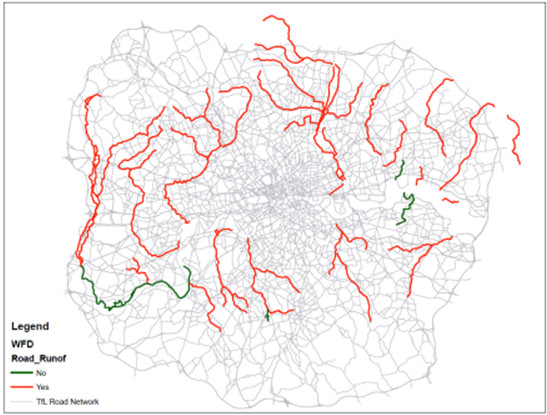More than 300 pollutants are being washed into London's rivers as a result of road run-off, doing lasting damage to aquatic habitats and contributing to fish deaths and the vast majority of the capital's rivers failing an EU water quality directive.
A groundbreaking study co-funded by the Greater London Authority, Transport for London (TfL) and the Environment Agency is set to report that around 30 river courses in London are failing the EU Water Framework Directive.
Only three or four rivers are unaffected by the pollutants under the Directive's standards (see image below).

Image from Thames21 on rivers impacted by pollution in London
Carried out by Thames21 together with a range of partners, notably Professor of Environmental Science in the Urban Pollution Research Centre at Middlesex University Lian Lundy, the study is set to change the way highways are managed in the capital.
In a joint statement, the GLA and TfL intend to ‘use the evidence developed in this programme when developing highway improvement schemes and hope that it will provide extra evidence as to the best way to target resources on SuDS [sustainable drainage systems]'.
The research looked at six main pollutants – including zinc, copper, suspended solids a couple of hydro carbons - as representative of the 300.
Normally such studies look at land use, but this study is thought to be the first that looked specifically at traffic data – the activity of the cars as opposed to just the roads themselves.
The study used traffic data/models to characterise the numbers and composition of traffic flows on roads on London's strategic roads from 2013 and projected to 2025.
It used the strategic routes and the transport models held for TfL and certain local roads.
John Bryden, head of improving rivers, at Thames21 said: 'Pollutants produced by cars come from a range of areas in the car and they function in a range of different ways – particularly we have looked at a number of different pollutants associated with brakes, tyres, the exhaust, the body of the cars; crashes can also put pollutants onto the road and that flows off the road into the drainage network and in some areas into the river.'
Long dry spells followed by rain cause particularly dangerous 'first flush' events that can cause fish kills by depositing large amounts of pollutants in a river in a short space of time.
However the general wash of pollutants also causes general and lasting wear to the aquatic environment experts said, shortening life spans and preventing creatures from breeding.
Transport Network understands that initial findings from research carried out by Veronica Edmonds-Brown have found pollutants in invertebrates.
The EU directive
The EU Water Framework Directive has several phases and sets a legally binding standard for desired water quality.
However clauses allow for countries to fall short of the standard in 2021 as a result of financial viability or whether it was technically possible. A final phase ends in 2027, when the UK must meet the standard or face prosecution if it is still an EU member.
The UK is due leave the EU by this time; however many are calling for the environmental standards to be kept on.
Environment Secretary Michael Gove has pledged that environmental standards will be kept or even strengthened post-Brexit.
With the UK having already failed to meet the EU's Air Quality Directive, experts suggest we are currently likely to miss the 2027 deadline to reach water quality standards. Currently around 80% of rivers in the UK would fail the target.
Mr Bryden said: 'The targets are very challenging. The UK is one of the worst but it is not the worst. It depends on how natural an environment a country has. Northern European nations like Belgium, the Netherlands and Germany are not doing well, whereas some southern European nations are meeting the target.
'There are several contributing factors to poor water quality including sewage and environment as well as road run-off. However at the moment road run-off alone would cause London to fail the EU standard.
'The way the directive is drawn up if one aspects fails they all fail.'
Sustainable drainage systems are seen as the best way to treat these pollutants and Thames21 adviseS these are considered with all highways works. It is also keen to work with Highways England to help address the issue on a national level.
The Thames21 study cost close to £50,000.
Top image from eBaum's world.
Register now for full access
Register just once to get unrestricted, real-time coverage of the issues and challenges facing UK transport and highways engineers.
Full website content includes the latest news, exclusive commentary from leading industry figures and detailed topical analysis of the highways, transportation, environment and place-shaping sectors.
Use the link below to register your details for full, free access.
Already a registered? Login